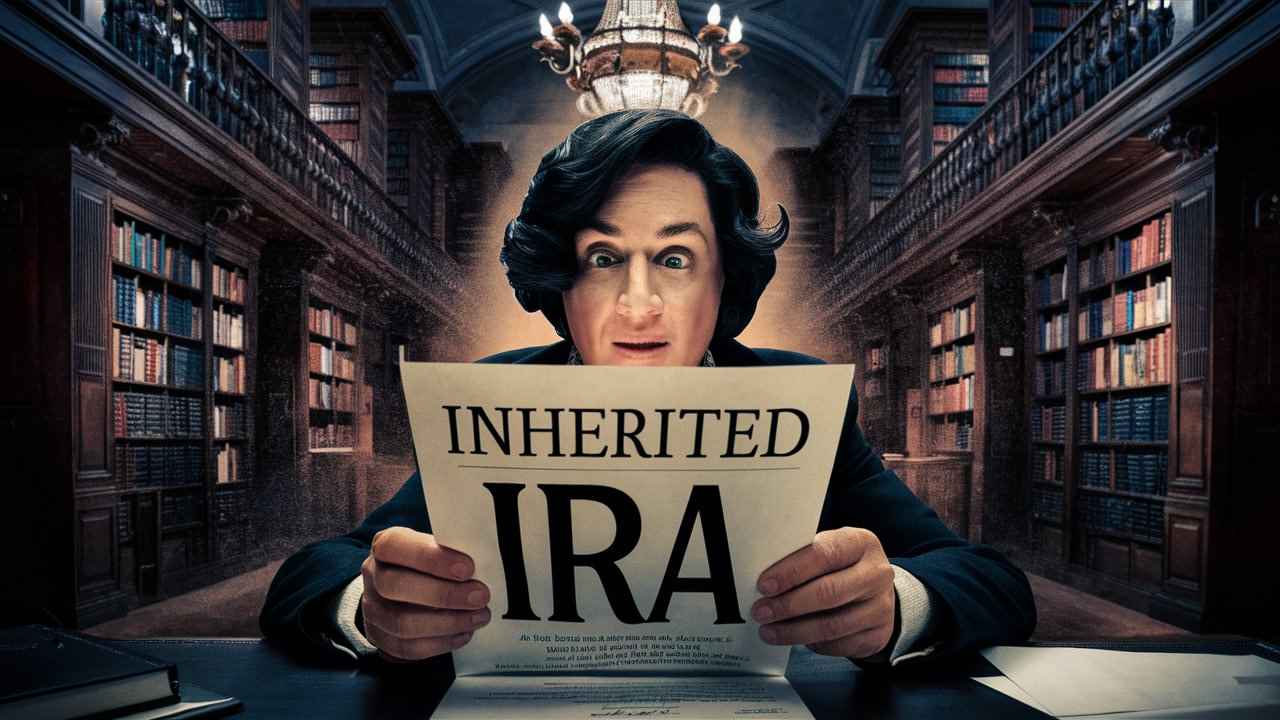A Twist in Inheritance: Why an Inherited IRA Can Get Complicated
Ah, the joys of inheritance💸picking up the pieces of a loved one’s life, often amidst heartfelt memories and, let’s be honest, a bit of chaos. Now, throw an Inherited IRA into the mix, and you’ve got yourself a conundrum wrapped in a riddle! Unlike your grandma’s antique china or that oddly-shaped lamp no one knows how to use, an Inherited IRA comes with its own set of labyrinthine rules, regulations, and tax implications that can leave even the most seasoned financial wizards scratching their heads.

The IRS and You: Understanding the Unique Challenges of an Inherited IRA
When it comes to dealing with the IRS, it’s like having a frenemy who insists on showing up at your birthday party uninvited. Inheriting an IRA means the IRS is very much involved in how you handle your newfound assets. You’ll be dancing to their tune, which is anything but straightforward. This article unravels the intricacies of inheriting an Inherited IRA so that you can navigate this murky territory without losing your mind💸or your money.
What is an Inherited IRA? Breaking Down the Basics
An Inherited IRA, also known as a beneficiary IRA, is a retirement account you inherit from someone who has passed away. It could be your parent, sibling, or even that eccentric uncle who claimed he was a time traveler. The beauty of this account is that it allows you to benefit from the tax-deferred status of the IRA, but💸there’s always a “but”💸the rules governing these accounts are anything but simple.
Inheriting an Inherited IRA: How Is It Different from a Regular IRA?
Unlike a regular IRA, which you can manage as you please (within the confines of IRS regulations, of course), an Inherited IRA comes with distinct rules tailored to protect the government’s interest in taxing the funds. For instance, while you can contribute to your own IRA, you cannot add new funds to an Inherited IRA. This isn’t a college fund; it’s a complex web of regulations designed to ensure that Uncle Sam gets his share.
The Role of the Original Beneficiary: How It Impacts Your Inheritance
Let’s not forget the original beneficiary💸the person who set up the account and chose you as their heir. Their age, relationship to you, and the nature of their IRA can dramatically affect your options. Did your beloved aunt create the account before the SECURE Act? Well, congratulations, you’ve just stepped into the time machine of tax law.

Types of Inherited IRAs
Spousal vs. Non-Spousal Inherited IRAs: What’s the Difference?
The key distinction between spousal and non-spousal inherited IRAs can feel like a game of Monopoly where one player can go straight to Boardwalk while the other has to navigate the whole board. Spousal beneficiaries have the luxury of treating the Inherited IRA as their own, rolling it into their own IRA if they so desire. Non-spousal beneficiaries, however, must adhere to more stringent rules, often leading to complicated tax implications and withdrawal strategies.💸
The Successor Beneficiary: What Happens When You Inherit from an Heir
If you thought you were off the hook after inheriting the IRA, think again! If your original beneficiary passes away before the IRA is fully distributed, you could become a successor beneficiary. This status means additional layers of complexity, as the IRS has more rules up their sleeves to ensure they get their cut, even if it means a convoluted series of steps to inherit what you thought was already yours.
Multiple Beneficiaries: Sharing the Inherited IRA Puzzle
Ah, the joys of sharing! If the original beneficiary designated multiple heirs, each beneficiary may face different rules depending on how the IRA was set up. You might find yourself splitting distributions and potentially paying taxes on your share while your sibling enjoys their portion tax-free. It’s like a family potluck gone wrong, with everyone grabbing at their own slice of the pie and trying not to spill anything.

Rules You Need to Know About Inherited IRAs
The SECURE Act: How New Rules Affect Inherited IRAs
The SECURE Act, passed in late 2019, shook up the world of inherited IRAs like a toddler in a toy store. It eliminated the “stretch” provision for many non-spousal beneficiaries, requiring them to deplete the account within ten years. This was a seismic shift, meaning beneficiaries must think strategically about when and how to withdraw funds, lest they face hefty tax bills.💸
Required Minimum Distributions (RMDs): When Do You Have to Start Taking Them?
With an Inherited IRA, you’ll likely encounter Required Minimum Distributions (RMDs)💸the IRS’s way of nudging you to withdraw funds, thus triggering taxes on the distributions. Depending on your relationship with the deceased and when they passed, you may have to start taking RMDs as soon as the year after their death. Procrastination isn’t just the thief of time; it’s the thief of your financial sanity.
10-Year Rule vs. Lifetime Stretch: Which Applies to You?
Ah, the infamous 10-year rule versus the elusive lifetime stretch. If you inherited from someone who died after 2019, you’ll generally have ten years to withdraw all funds from the Inherited IRA. However, if you’re a spousal beneficiary, you can stretch distributions over your life expectancy. Understanding which rule applies to you is crucial; otherwise, you might find yourself in a tax pickle.

Tax Implications of Inheriting an Inherited IRA
Uncle Sam Wants a Cut: How Inherited IRAs Are Taxed
When it comes to taxes, the IRS plays a long game. Inherited IRAs are subject to income tax upon withdrawal, and the tax rate is based on your current income. So, if you decide to cash out, expect to greet a hefty tax bill that might make you question your life choices. Planning ahead is your best defense against Uncle Sam’s insatiable appetite for your hard-earned cash.💸
Roth vs. Traditional Inherited IRAs: Different Tax Strategies
The distinction between a Roth and a Traditional Inherited IRA is akin to choosing between a frothy latte and an espresso shot💸both will give you a boost, but they come with different flavors. With a Roth IRA, you can withdraw funds tax-free since contributions were made with after-tax dollars. In contrast, Traditional IRAs will lead you down the path of taxable withdrawals. Understanding these nuances is essential to devising a strategy that aligns with your financial goals.
Avoiding Tax Traps: Common Mistakes and How to Sidestep Them
Inheriting an IRA can feel like navigating a minefield, with hidden tax traps lurking around every corner. Common blunders include failing to take RMDs on time, misunderstanding the tax implications of cashing out, or assuming that all inherited IRAs are treated the same. Being informed and proactive can save you from costly mistakes that leave you feeling like you’ve been caught in a fiscal quagmire.

Strategic Withdrawal Options
Lump-Sum Distribution: Quick Cash but at a Cost
The allure of a lump-sum distribution can be tempting💸who wouldn’t want a windfall? But hold your horses! While cashing out may provide immediate liquidity, it also catapults you into a higher tax bracket, potentially leading to a tax bill that feels more like a gut punch than a pleasant surprise. Weighing the pros and cons is vital; sometimes, less is more when it comes to withdrawals.
Stretching Distributions: How to Minimize Tax Impact Over Time
For those with a penchant for strategy, stretching distributions over several years can mitigate the tax impact significantly. By carefully orchestrating withdrawals, you can keep your taxable income in check, allowing your funds to continue growing. It’s like playing a game of chess where each move is calculated to achieve financial checkmate down the line.
Should You Leave the Funds Untouched? Pros and Cons of Waiting
Ah, the age-old question: to withdraw or not to withdraw? Leaving the funds untouched can offer the benefits of compounding interest, but it also comes with the potential for future tax implications. Timing is everything, and considering your financial situation and future goals will guide your decision-making. Sometimes, patience can be your best ally.💸

What Happens if You Don’t Follow the Rules?
The Penalty Monster: What Happens if You Miss an RMD?
Failing to take an RMD can trigger penalties that will make you weep. The IRS imposes a staggering 50% penalty on the amount you should have withdrawn. That’s right💸half! It’s like inviting a guest to your party only for them to eat all your snacks and leave you with an empty bowl. Staying informed and organized is essential to avoid falling prey to this monstrous penalty.
The IRS and Late RMDs: Can You Get a Waiver?
If you find yourself in a bind and miss an RMD, fear not; the IRS may grant you a waiver under certain conditions. However, it’s not a guarantee and often involves a labyrinthine process filled with forms and documentation. The best course of action is to stay ahead of the game and keep meticulous records, thus dodging this bureaucratic bullet altogether.💸
Special Considerations for Non-Spouse Heirs
Being a Non-Spouse Beneficiary: What Restrictions Apply to You?
As a non-spouse beneficiary, you might feel like you’ve been handed the short end of the stick. The rules governing your inheritance are far stricter, leaving you with fewer options for managing the account. You won’t be able to treat the IRA as your own, nor can you roll it into another IRA. Understanding these limitations is crucial to avoid costly mistakes that could derail your financial future.
How Non-Spouse Beneficiaries Can Avoid Major Pitfalls
While the rules may seem daunting, non-spouse beneficiaries can take proactive steps to navigate the complexities. Educating yourself about your options, consulting with financial advisors, and having a clear withdrawal strategy can turn this potential minefield into a manageable pathway. Knowledge is power, and in this case, it can save you from unnecessary headaches.💸
Spousal Inherited IRAs: Your Unique Benefits
The Spousal Advantage: Why a Surviving Spouse Has More Options
As a surviving spouse, you’ve hit the jackpot in the world of Inherited IRAs! You enjoy unique advantages, including the ability to treat the Inherited IRA as your own. This means you can roll it over into your own IRA and defer RMDs until you reach the required age. With great power comes great responsibility, so knowing how to wield this advantage is key.
Treating the IRA as Your Own: A Smart Strategy for Spouses?
Treating the Inherited IRA as your own can be a savvy strategy. By rolling the funds into your own IRA, you can maintain the tax-deferred status and potentially increase your tax-free growth. However, this choice also means that you’ll be subject to RMD rules as they apply to your age, so it’s important to weigh the options carefully.💸
Inherited IRA Rollover Options
Can You Roll Over an Inherited IRA? Understanding the Rules
The question of rolling over an Inherited IRA can be like untangling a box of holiday lights💸confusing and time-consuming. Generally, you cannot roll over an Inherited IRA into your own IRA if you’re a non-spouse beneficiary. However, spousal beneficiaries enjoy a bit more leeway, allowing for rollovers and potentially more favorable tax treatment. Knowing the specifics can help you maximize your benefits.
The Right Way to Roll Over: How to Avoid Penalties and Taxes
If you decide to roll over your Inherited IRA, following the rules is paramount to avoid penalties and taxes. Ensure the transfer is completed as a direct rollover, and maintain clear documentation. A misstep could lead to unwanted tax consequences that may haunt you like a ghost at a family reunion.
When Should You Consult a Financial Advisor?
The Value of Professional Help: Why an Advisor Can Be Your Best Friend
When it comes to managing the complexities of an Inherited IRA, enlisting a financial advisor can be your secret weapon. With a wealth of knowledge about tax laws, withdrawal strategies, and estate planning, they can help you navigate the choppy waters of your inheritance. Think of them as your financial lifeguard, ensuring you don’t drown in a sea of confusion.
Key Questions to Ask Your Financial Advisor About Inherited IRAs
Before diving into discussions with your advisor, prepare a list of key questions to ensure you cover all your bases. Inquire about the specific implications of the SECURE Act, how to maximize tax efficiency, and the most strategic withdrawal methods. The more informed you are, the better equipped you’ll be to make decisions that align with your financial goals.💸
Mistakes to Avoid When Inheriting an Inherited IRA
Ignoring the 10-Year Rule: The Risk of Procrastination
Procrastination may be the thief of time, but in the case of an Inherited IRA, it can also be the thief of money. Ignoring the 10-year rule can lead to substantial tax penalties down the line, as you may find yourself scrambling to withdraw funds hastily and incurring a massive tax hit. Being proactive is key; the earlier you develop a strategy, the better your financial outcome will be.
Not Understanding the Impact of RMDs: A Common Trap
RMDs can feel like a sticky note left on your fridge💸easy to ignore until you’re slapped in the face with it at the worst possible moment. Failing to comprehend the implications of RMDs can lead to serious financial repercussions, including hefty penalties. Ensure you understand the RMD requirements specific to your situation, so you’re never caught off guard.
Common Misconceptions About Inherited IRAs
The Myth of Unlimited Stretching: Why You Can’t Stretch Inherited IRAs Forever
The idea that you can stretch an Inherited IRA indefinitely is a common misconception that can lead to severe tax consequences. While some beneficiaries enjoyed this luxury in the past, the SECURE Act has curtailed this option for many. Understanding the new rules surrounding distributions is crucial to avoid disappointment and potential financial pitfalls.
“I’ll Just Cash Out!” Why That’s Not Always the Best Option
While cashing out may seem like a straightforward solution, it often comes with strings attached💸namely, tax implications that can leave you reeling. The immediate gratification of a cash-out can be tempting, but a little foresight and planning can often yield greater long-term benefits.
Estate Planning and Inherited IRAs
The Role of Estate Planning in Managing an Inherited IRA
Estate planning is not just for the wealthy; it’s a vital component of managing an Inherited IRA effectively. By putting a comprehensive estate plan in place, you can navigate the complexities of tax implications and inheritance laws, ensuring that your assets are distributed according to your wishes and with minimal tax burden.💸
Setting Up a Successor Beneficiary: What You Should Consider
When setting up a successor beneficiary for your Inherited IRA, consider the long-term ramifications of your choice. This decision can affect tax strategies, distribution timelines, and overall estate planning. Be sure to communicate your intentions clearly to avoid confusion among your heirs.
How to Maximize the Value of an Inherited IRA
Timing Your Withdrawals: Getting the Most Out of Your Inheritance
Timing is everything when it comes to withdrawals from an Inherited IRA. Developing a strategic plan for when and how much to withdraw can significantly impact your overall tax liability. By considering your financial situation, tax bracket, and future needs, you can maximize the value of your inheritance.
Balancing Tax Efficiency with Long-Term Growth
Striking a balance between tax efficiency and long-term growth is the Holy Grail for beneficiaries of Inherited IRAs. Engaging with a financial advisor can help you develop a nuanced strategy that allows your funds to grow while minimizing your tax burden. It’s a tightrope walk, but with the right guidance, you can achieve your financial goals.💸
Case Studies: Real-Life Stories of Inherited IRA Challenges
When Inheriting an Inherited IRA Went Wrong: Lessons Learned
Consider the tale of Joe, who inherited an IRA from his father and didn’t bother to learn about RMDs. Fast forward to tax season, and Joe found himself staring down a 50% penalty for not taking the required distributions. His experience serves as a cautionary tale💸knowledge is power, and failing to stay informed can lead to costly mistakes.
Success Stories: How Beneficiaries Navigated the Complexities
On the flip side, we have Lisa, who inherited an IRA and took the time to consult with a financial advisor. By developing a strategic withdrawal plan and utilizing tax-efficient strategies, Lisa not only minimized her tax burden but also allowed her inherited funds to flourish. Her success story highlights the importance of being proactive and informed.
Inherited IRAs and Charitable Giving
Donating Your Inherited IRA: Is It a Good Strategy?
Donating your Inherited IRA to charity can be a noble gesture, but it’s not without its complexities. While charitable donations can provide tax benefits, they also require careful planning to ensure that you’re making the most of your generosity. Consulting with a financial advisor can help clarify the implications and maximize the benefits.💸
Tax Benefits of Using an Inherited IRA for Charitable Purposes
Using an Inherited IRA for charitable purposes offers unique tax benefits. By donating your IRA directly to a charity, you can potentially avoid income taxes on the distribution, making it a win-win for both you and your chosen organization. Strategic philanthropy is not just good for your soul; it can be good for your wallet too.
Filing the Right Paperwork
Getting Your Documentation in Order: The First Step in Inheriting
The first step in managing an Inherited IRA is getting your documentation in order. This includes a copy of the death certificate, the will, and the account statement. The better organized you are, the smoother the process will be, allowing you to focus on the financial implications instead of drowning in paperwork.
Why It’s Important to Notify Your IRA Custodian Immediately
Notifying your IRA custodian about the death of the account owner is crucial. Failing to do so can complicate the process and lead to unwanted delays in accessing the funds. Timely communication ensures that you remain compliant with IRS regulations and can move forward with managing the inherited account effectively.💸
Planning for Your Own Beneficiaries
Preparing Your Own IRA for Smooth Inheritance
Planning for your own beneficiaries is an often-overlooked aspect of IRA management. By setting up clear designations and understanding the implications of the SECURE Act, you can ensure that your heirs won’t be left scrambling to navigate the complexities of inheriting your IRA. Proactive planning can save them time, money, and headaches down the road.
How to Avoid Creating a Complicated Inherited IRA for Your Heirs
To avoid creating a convoluted mess for your heirs, consider consulting with an estate planning professional. By clearly outlining your wishes and designating beneficiaries thoughtfully, you can streamline the process, making it easier for your loved ones to manage their inheritance. After all, leaving behind clarity is the ultimate gift.💸
Frequently Asked Questions
Can I Convert an Inherited IRA to a Roth IRA?
Converting an Inherited IRA to a Roth IRA is generally not permissible for non-spouse beneficiaries. However, spousal beneficiaries have more flexibility. Understanding the rules surrounding conversions is essential for making informed decisions about your inherited assets.
Do I Have to Take RMDs if I’m Under 59½?
Yes, non-spouse beneficiaries must still take RMDs from an Inherited IRA, even if they are under 59½. Failing to adhere to the RMD schedule can lead to significant penalties, so staying informed is crucial.
What Happens if I Don’t Want the Inherited IRA?
If you don’t want the Inherited IRA, you can choose to disclaim it. This legal process allows you to renounce your inheritance, which can benefit your beneficiaries, allowing them to receive the funds without additional tax implications. Consult with a legal advisor to understand the implications and ensure a smooth process.
Conclusion
Inherited IRAs: A Blessing or a Burden?
Navigating the labyrinth of Inherited IRAs can feel like a daunting task. Yet, with the right knowledge and strategies, what might initially appear to be a burden can transform into a valuable financial opportunity. It’s essential to arm yourself with information and seek professional guidance to turn this challenge into a blessing.
Final Thoughts: How to Turn an Inherited IRA into a Financial Opportunity
In the end, inheriting an IRA can provide financial advantages, but it requires careful planning and informed decision-making. By understanding the rules and potential pitfalls, you can maximize the benefits of your inheritance while minimizing any tax implications. After all, life is too short to leave money on the table.
Call to Action
Ready to Navigate Your Inherited IRA? Here’s What to Do Next
Armed with the knowledge from this article, you’re now better prepared to tackle the intricacies of Inherited IRAs. Take the next steps: review your options, consult with financial professionals, and develop a strategic withdrawal plan.
Still Confused? Talk to a Financial Expert Today
If you’re feeling overwhelmed, don’t hesitate to reach out to a financial advisor. Their expertise can help clarify the complexities and ensure you make the best decisions for your unique situation.
People Also Ask
What happens when an inherited IRA owner passes?
When the inherited IRA owner passes, the account may be passed to a successor beneficiary if designated. The new heir must follow distribution rules based on the original owner’s timeline. The 10-year rule will likely apply for non-spousal beneficiaries, meaning the account must be emptied within a decade.
Is there a penalty on an inherited IRA?
Yes, penalties can occur with inherited IRAs. If required minimum distributions (RMDs) are missed, the IRS can impose a 50% penalty on the amount that should have been withdrawn. This is one of the harshest penalties in tax law.
Who is exempt from the 10-year rule when inheriting an IRA?
Certain individuals, like surviving spouses, disabled beneficiaries, minors (until they reach the age of majority), and beneficiaries not more than 10 years younger than the original owner, are exempt from the 10-year rule and may take distributions over their lifetime.
What is the disadvantage of an inherited IRA?
The main disadvantage of an inherited IRA is the tax burden. Withdrawals are taxed as ordinary income, and for non-spouse beneficiaries, they must empty the account within 10 years, which can push them into a higher tax bracket.
How do I handle an inherited IRA from my parents?
First, determine the type of IRA (Roth or Traditional). Next, consult the distribution rules💸whether you must follow the 10-year rule or take annual RMDs. You’ll also want to understand the tax implications and decide whether to spread distributions over time or take a lump sum.
Is inherited IRA tax-free?
No, inherited IRAs are not tax-free unless it’s a Roth IRA, and even then, some conditions apply. Traditional IRAs are taxed as ordinary income when distributions are taken, which could lead to a significant tax bill.
Can I withdraw all the money from an inherited IRA?
Yes, you can withdraw all the money from an inherited IRA in a lump sum, but it will be taxed as ordinary income for that year. This could push you into a higher tax bracket, leading to a larger tax burden.
What are the new rules for inherited IRAs?
The SECURE Act of 2019 changed the landscape for inherited IRAs. Non-spouse beneficiaries must now withdraw the entire balance within 10 years. The lifetime “stretch” option is no longer available for most heirs, except for eligible designated beneficiaries like spouses and disabled individuals.
Can you transfer ownership of an inherited IRA?
No, you cannot transfer ownership of an inherited IRA. The IRA must remain in the deceased owner’s name, and beneficiaries can only transfer it to another inherited IRA account but not to their personal IRA.
Are inherited IRA RMDs required in 2024?
Yes, required minimum distributions (RMDs) from inherited IRAs are expected to be required in 2024 under current IRS rules, unless the account falls under the 10-year rule, in which case beneficiaries have to empty the account by the 10th year without annual RMDs.
What do I do if I just inherited an IRA?
Start by identifying the type of IRA and consult the rules for distribution. Review any required minimum distributions (RMDs) and consider the tax implications before deciding whether to take a lump sum or stretch distributions.
How should an inherited inherited IRA be titled?
An inherited IRA should be titled in the deceased original owner’s name, followed by “for the benefit of” (FBO) the beneficiary’s name. For example: “John Doe IRA (Deceased 01/01/2023) FBO Jane Doe.”
Can an inherited IRA be split between beneficiaries?
Yes, an inherited IRA can be split between multiple beneficiaries. Each beneficiary will be responsible for their portion, and they must adhere to the respective RMD or distribution rules independently.
What happens if you don’t take RMD from inherited IRA?
If you don’t take the required minimum distribution (RMD) from an inherited IRA, the IRS can impose a penalty equal to 50% of the amount that should have been withdrawn. This is a steep penalty, so it’s important to stay on top of RMD deadlines.
What happens when someone with an inherited IRA dies?
If the inheritor of an inherited IRA dies, the account can be passed to a successor beneficiary. The new beneficiary must follow the same distribution rules that were applicable to the deceased inheritor, typically under the 10-year rule.
Can you gift money from an inherited IRA?
You cannot directly gift an inherited IRA itself, but you can withdraw funds from the account and then gift the money. However, the withdrawal would be subject to taxes, so you’d want to carefully consider the tax consequences before gifting.









